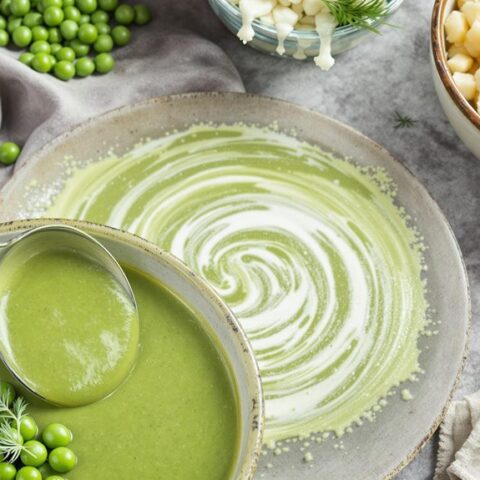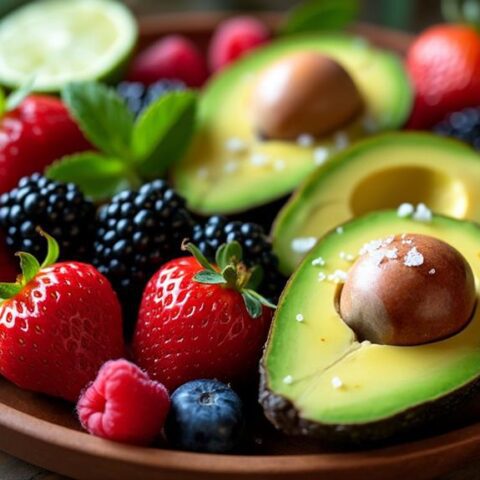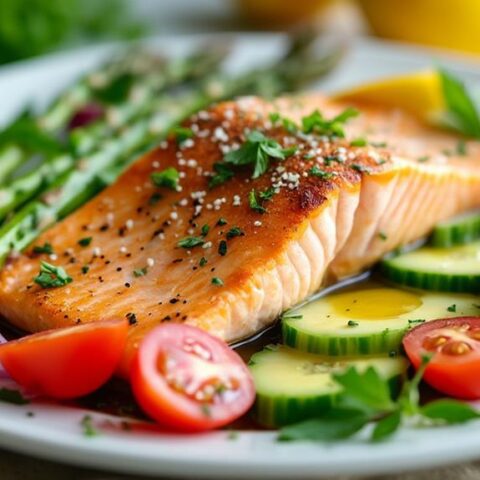
Mandarin oranges are not considered low-carb fruits, containing approximately 13.34 grams of total carbohydrates per 100-gram serving, with 11.54 grams of net carbs. While they offer significant nutritional benefits, including vitamin C and fiber, their moderate carbohydrate content requires careful portion control for those following low-carb diets. The fruit's low glycemic index suggests a slower blood sugar response, making it a better choice than high-sugar alternatives. Understanding the complete nutritional profile helps create balanced dietary choices.
Key Takeaways
- Mandarin oranges contain 13.34g total carbs per 100g serving, with 11.54g net carbs, making them moderately high in carbohydrates.
- They're not typically considered low-carb friendly, as one medium mandarin provides around 12g carbs from your daily allowance.
- Mandarins have a similar carb content to regular oranges but contain more carbs than lemons and limes.
- Their low glycemic index and fiber content help moderate blood sugar impact, despite their carbohydrate content.
- Portion control is essential; consider limiting intake to half a mandarin or a few segments when following low-carb diets.
Understanding the Carbohydrate Content of Mandarin Oranges
The carbohydrate composition of mandarin oranges presents important considerations for those monitoring their daily carb intake. A 100-gram serving contains approximately 13.34 grams of carbohydrates, with the net carb count reaching 11.54 grams after subtracting dietary fiber.
For carb-conscious eaters, mandarin oranges require close monitoring, containing 13.34g carbs per 100g serving, with 11.54g net carbs.
While these citrus fruits offer valuable nutrients like Vitamin C, their carbohydrate content poses challenges for individuals following restrictive eating plans.
When compared to other low-carb fruits, mandarin oranges contain a relatively high amount of carbohydrates, with a medium-sized fruit providing around 12 grams. This substantial carb content can quickly impact daily allowances, particularly for those adhering to ketogenic or low-carb diets.
Despite their nutritional benefits, including potassium and fiber content, the significant carbohydrate levels make mandarins a fruit that requires careful portion control.
Net Carbs vs. Total Carbs in Mandarins
When examining mandarin oranges' carbohydrate content, it's important to distinguish between total carbs and net carbs, with the latter being more relevant for dietary planning.
A 100g serving of mandarin oranges contains 13.34g of total carbohydrates, which includes 1.8g of dietary fiber that doesn't impact blood sugar levels.
After subtracting the fiber content, mandarin oranges contain 11.54g of net carbs per 100g serving, making them a relatively high-carb fruit that requires careful portion control for those monitoring their carbohydrate intake.
Understanding Total Carb Breakdown
Because understanding the difference between total and net carbs plays a fundamental role in dietary planning, careful examination of mandarin oranges' carbohydrate content becomes essential for health-conscious individuals.
In a 100g serving, mandarins contain 13.34g of total carbohydrates, with net carbs amounting to 11.54g after subtracting fiber content. This carb breakdown is particularly significant for those following low-carb diets, as these citrus fruits can quickly accumulate toward daily carbohydrate limits.
For individuals monitoring blood sugar levels or maintaining ketosis, it's important to note that mandarins' net carb content represents the portion that directly impacts glucose levels.
Within the context of typical ketogenic diet restrictions of 20-50g daily, even moderate mandarin consumption requires careful portion control and meal planning.
Net Carbs Per Serving
Understanding mandarin oranges' net carb content requires careful examination of their nutritional breakdown per serving.
In a 100g portion of mandarin oranges, the total carbohydrates amount to 13.34g, with 1.8g of dietary fiber. When calculating net carbs by subtracting fiber from total carbohydrates, the result is 11.54g of net carbs per serving.
For those following a low-carb or ketogenic diet, this amount represents a significant portion of their daily carbohydrate allowance.
A medium-sized mandarin, weighing approximately 88 grams, contains about 12g of carbs, making it a relatively high-carb fruit choice.
This net carb content suggests that individuals adhering to strict carbohydrate restrictions should carefully monitor their mandarin orange consumption or consider alternative fruits with lower carb profiles.
Mandarin Orange's Impact on Blood Sugar
While mandarin oranges offer numerous nutritional benefits, their impact on blood sugar requires careful consideration for those monitoring their glucose levels. With 11.54g of net carbs per 100g serving, these citrus fruits can cause a moderate rise in blood glucose levels, making portion control essential for individuals managing their carbohydrate intake.
However, mandarin oranges possess characteristics that help moderate their glycemic impact. Their low glycemic index indicates a slower, more gradual blood sugar response compared to high-glycemic alternatives.
Additionally, the presence of dietary fiber (1.8g per 100g) helps slow sugar absorption in the bloodstream, contributing to more stable glucose levels. This combination of factors makes mandarin oranges a manageable option when incorporated thoughtfully into a balanced diet, particularly for those mindful of their blood sugar control.
Nutritional Benefits Beyond Carbohydrates
While mandarin oranges are often recognized for their carbohydrate content, their impressive vitamin C levels support immune function and maintain skin health through collagen production. These citrus fruits deliver essential minerals, including potassium for muscle function, calcium for bone strength, and magnesium for energy metabolism, alongside powerful antioxidant compounds that help protect cells from damage. The combination of soluble and insoluble fiber in mandarins promotes digestive health, helps maintain stable blood sugar levels, and contributes to a feeling of fullness after consumption. Additionally, mandarin oranges can be a part of a balanced diet that aids in appetite regulation due to their fiber content and low-calorie profile, helping to promote satiety without excess caloric intake.
Vitamin C Health Impact
The nutritional powerhouse of mandarin oranges extends far beyond their carbohydrate content, with Vitamin C standing as their most notable health-promoting component. With 44% of the daily recommended value in just 100 grams, these citrus fruits deliver significant nutritional value through their abundant antioxidant content.
The Vitamin C in mandarin oranges plays an essential role in supporting immune system function, helping the body defend against various pathogens and infections.
When incorporated into a healthy diet, mandarin oranges provide additional benefits through their flavonoids, which work synergistically with Vitamin C to combat oxidative stress.
This powerful combination not only strengthens the body's natural defense mechanisms but also contributes to skin health and may help reduce the risk of chronic diseases.
Mineral-Rich Antioxidant Properties
Beyond their well-known vitamin C content, mandarin oranges pack a remarkable array of minerals and antioxidants that contribute considerably to overall health and wellness.
These citrus fruits provide significant amounts of potassium, supporting cardiovascular function and muscle health, while their magnesium and calcium content promotes strong bones and efficient metabolic processes.
The antioxidants in mandarins, particularly flavonoids, work synergistically with vitamin C to protect cells from oxidative damage and reduce the risk of chronic diseases.
Additionally, their fiber content aids digestive health, while the combination of minerals enhances nutrient absorption.
This nutritional profile makes mandarins an excellent choice for those seeking extensive health benefits, as they deliver essential nutrients in a naturally sweet package.
Fiber For Digestive Wellness
Inside each mandarin orange lies a powerhouse of digestive wellness, thanks to its impressive fiber content of 1.8 grams per 100-gram serving. This soluble fiber plays an essential role in maintaining a healthy gut by regulating bowel movements and softening stools, while supporting a robust microbiome vital for immune function.
| Fiber Benefits | Impact on Health |
|---|---|
| Digestive Aid | Regular bowel movements |
| Gut Health | Enhanced microbiome |
| Satiety | Weight management |
| Daily Intake | Part of balanced diet |
When incorporated into a balanced diet, mandarins contribute notably to the recommended daily fiber intake of 25-38 grams, promoting digestive health and weight management through increased satiety. The fiber's ability to create a feeling of fullness makes these citrus fruits an excellent choice for those seeking to maintain a healthy lifestyle.
Comparing Mandarins to Other Citrus Fruits
When comparing mandarin oranges to other citrus fruits, their carbohydrate content reveals important distinctions for health-conscious consumers. With 11.54g of net carbs per 100g serving, mandarins contain more carbohydrates than lemons and limes, which are significantly lower-carb citrus options.
Mindful eaters should consider that mandarin oranges pack more carbs than lemons and limes, offering 11.54g net carbs per serving.
While mandarins and regular oranges share similar carbohydrate levels around 12g per 100g, mandarins offer better blood sugar management due to their lower glycemic index.
Clementines and tangerines, close relatives of mandarins, present comparable carbohydrate profiles. Clementines edge slightly higher at 12g per 100g but compensate with enhanced Vitamin C content.
Tangerines match mandarins' carb content at approximately 11g per 100g and feature easier peeling characteristics. For those following strict low-carb diets, berries might prove a better choice, as they typically contain fewer carbohydrates.
Portion Control Strategies for Mandarin Lovers
Measuring appropriate portions of mandarin oranges requires attention to detail, with experts recommending starting at half a medium-sized fruit or a few segments to manage carbohydrate intake effectively.
Success in portion control often comes from practical strategies, such as pre-portioning mandarin segments into small containers or combining them with protein-rich foods to create balanced snacks.
Those who carefully track their mandarin consumption through food apps or journals typically find it easier to maintain their desired carbohydrate limits while still enjoying this nutritious citrus fruit.
Measuring Mandarin Serving Sizes
Understanding proper serving sizes plays an essential role in managing mandarin orange consumption, particularly for individuals monitoring their carbohydrate intake. A medium mandarin contains approximately 12 grams of carbohydrates, making accurate measuring vital for portion control.
Using a food scale provides precise measurements, helping consumers track their carb intake effectively. For those seeking to reduce carbohydrate consumption, eating half a mandarin, weighing about 44 grams, delivers roughly 6 grams of carbs.
When consuming pre-packaged mandarins, careful attention to serving size information on labels helps maintain portion control. To successfully incorporate mandarins into a balanced diet, combine them with low-carb foods like proteins or leafy greens, ensuring carbohydrate limits remain within desired ranges.
Smart Snacking Success Tips
Smart portion control strategies can transform how mandarin lovers enjoy their favorite citrus fruit while maintaining dietary goals. For effective smart snacking, enthusiasts should measure their servings carefully, limiting intake to half a medium mandarin to manage carb content while still enjoying this healthy fruit.
To enhance portion control success, pair mandarins with protein-rich, low in calories options like nuts or cheese, which help maintain satiety while balancing overall carbohydrate intake.
Using food tracking applications provides precise monitoring of daily carb consumption, ensuring mandarin servings align with dietary restrictions. For those seeking additional flexibility, incorporating mandarins as flavor enhancers rather than main ingredients offers a practical approach to enjoying their distinctive taste while maintaining carb limits.
Best Times to Enjoy Mandarins on a Low-Carb Diet
Three strategic moments exist for enjoying mandarin oranges while maintaining a low-carb lifestyle. For ideal timing, consider consuming these citrus treats during periods of increased physical activity, particularly post-workout when the body efficiently processes carbohydrates.
Additionally, pairing mandarin oranges with healthy fats helps regulate blood sugar spikes while enhancing the overall snacking experience.
- Post-workout recovery periods when glycogen stores need replenishment
- Mid-morning snacks paired with protein-rich foods
- Pre-exercise fuel, consumed 30 minutes before activity
- Special occasions or planned treat meals when carb allowances are higher
Understanding these ideal timing windows allows individuals following a low-carb diet to enjoy mandarin oranges strategically while maintaining their nutritional goals and managing carbohydrate intake effectively.
Low-Carb Alternatives to Mandarin Oranges
While mandarin oranges offer distinct nutritional benefits, several lower-carbohydrate alternatives provide similar satisfaction for those following a carb-restricted diet.
Berries emerge as excellent low-carb alternatives, with strawberries containing just 8g of carbs per 100 grams, while raspberries and blackberries offer similar nutritional profiles with 12g and 10g respectively.
Sweet and satisfying, berries provide a naturally low-carb indulgence with strawberries, raspberries, and blackberries all containing 12g or fewer carbs per serving.
For those seeking healthy fats alongside minimal carbohydrates, avocados present an ideal option with only 9g of carbs per 100 grams.
Citrus lovers can incorporate lemons and limes for flavor, as these fruits contribute minimal carbohydrates while maintaining that desired tang.
Cucumbers serve as a revitalizing alternative with merely 3.6g of carbs per 100 grams, and almonds provide a satisfying crunch while delivering beneficial fats and keeping carbohydrates in check.
Incorporating non-starchy vegetables like spinach and kale ensures nutrient-dense options that align with low-carb goals while offering essential vitamins and fiber.
Hidden Sources of Mandarin in Processed Foods
Beyond fresh mandarin oranges and their alternatives, consumers should be aware of the numerous processed foods that incorporate mandarin ingredients in less obvious ways.
These hidden sources can notably impact a low-carb diet through unexpected carbohydrate content. Understanding where mandarin oranges appear in processed foods is vital for maintaining dietary goals.
- Fruit cocktails, salads, and desserts often contain mandarin segments with added sugars
- Yogurts and smoothies frequently include mandarin puree or juice concentrates
- Sauces and marinades may use mandarin extracts or flavorings
- Canned mandarins in syrup have raised carbohydrate levels compared to fresh fruit
Careful label reading is essential, as even products marketed as healthy can contain mandarin-derived ingredients that contribute unexpected carbs to daily intake.
Seasonal Availability and Carb Variations
As temperatures drop and winter approaches, mandarin oranges enter their peak season from November through April, offering consumers excellent access to these nutrient-rich citrus fruits.
The seasonal variations in growing conditions greatly influence the carbohydrate content of these popular citrus fruits, with mandarins containing approximately 11.54g of net carbs per 100g serving.
Weather patterns during the growing season play an essential role in determining sugar content, as mandarins grown in ideal conditions typically develop higher sweetness levels.
Consumers tracking their carbohydrate intake should note that peak-season mandarins may exhibit subtle variations in their nutritional profile compared to off-season fruit.
These differences are often reflected in both taste and carbohydrate levels, making it worthwhile to monitor nutritional content throughout the growing season.
Storage Tips to Preserve Nutritional Value
Proper storage techniques play an essential role in maintaining the nutritional value and freshness of mandarin oranges throughout their shelf life. Following specific storage tips guarantees these citrus fruits retain their prime flavor and nutritional benefits for extended periods, whether they remain whole or are peeled for convenience.
Smart storage practices help preserve mandarin oranges' nutrient content and taste, ensuring they stay fresh and delicious longer.
- Store whole mandarins at room temperature for up to 7 days to maintain freshness.
- Refrigerate peeled segments in an airtight container for up to 6 weeks.
- Avoid freezing mandarins, as temperatures below 32°F damage their structure.
- Serve mandarins chilled to enhance flavor and juiciness.
For maximum preservation of nutrients, store peeled mandarin segments in airtight containers to prevent exposure to air and minimize moisture loss. This method helps maintain the fruit's high water content while protecting its delicate cellular structure from deterioration.
Recipe Modifications for Lower Carb Impact
While mandarin oranges add a delightful burst of flavor to many dishes, their relatively high carbohydrate content may not align with low-carb dietary goals. Several recipe modifications can help maintain the desired taste while reducing overall carb count.
Substituting mandarin oranges with lower-carb fruits like berries can greatly decrease the carbohydrate impact of recipes, as berries contain fewer net carbs per serving.
For those seeking to preserve citrus flavors without the carbs, incorporating lemon or lime juice in dressings and marinades offers a practical alternative.
Additionally, using mandarin orange zest or extracts in baking provides the characteristic citrus taste with minimal carbohydrate contribution.
When preparing fruit-based dishes, balance can be achieved by combining low-carb vegetables, nuts, and seeds with small portions of mandarin oranges.
For those on a keto diet, avoiding starchy vegetables like potatoes and corn can help maintain a low-carb intake while enjoying citrus flavors.
Research-Backed Health Effects of Mandarins
Scientific research has consistently demonstrated the substantial health benefits of mandarin oranges, supported by their rich nutritional profile and bioactive compounds.
While following a low carb lifestyle requires careful consideration of their 11.54 net grams of carbohydrates per 100 grams, mandarins offer significant nutritional advantages that warrant attention.
- Provides 26.7 mg of Vitamin C per 100 grams, supporting a healthy immune system and skin health
- Contains potassium at 166 mg per 100 grams, essential for heart and muscle function
- Helps prevent kidney stone formation through increased urinary citrate levels
- Rich in flavonoid antioxidants that combat cellular damage and may reduce cancer risk
These research-backed benefits highlight why mandarins, despite their carbohydrate content, remain valuable in a balanced diet focused on overall health optimization.
Frequently Asked Questions
Can You Eat Mandarin Oranges on a Low Carb Diet?
Mandarin oranges should be limited on low-carb diets due to high carbohydrate content. While offering nutrition benefits, their 12g carbs per fruit can impact weight loss strategies. Lower-carb citrus alternatives support healthier snacking options.
What Is Healthier, Orange or Mandarin?
Both fruits offer comparable health benefits, with oranges containing higher vitamin C content. Mandarins have slightly lower sugar levels and fewer calories. Either choice provides excellent nutritional value for everyday consumption.
How Many Mandarin Oranges Can I Eat a Day?
Daily intake of mandarin oranges depends on individual nutritional goals. For balanced portion control, consuming 1-2 servings (88-176g) provides essential nutrients while managing sugar content without excessive calories.
What Fruit Has the Lowest Carbohydrate?
Among low carb fruits, avocados contain the lowest carbohydrate content at approximately 2 grams per 100 grams, offering significant health benefits while allowing for easier dietary management in carb-restricted eating plans.
Conclusion
While mandarin oranges contain moderate carbohydrates, their nutritional benefits and lower glycemic impact compared to other fruits make them a reasonable choice for those monitoring carb intake. When consumed in moderation, mandarins can fit into a balanced diet, offering essential vitamins, minerals, and fiber. Understanding proper portion sizes and considering net carbs versus total carbs allows health-conscious individuals to enjoy these citrus fruits while maintaining their dietary goals.










No Comments